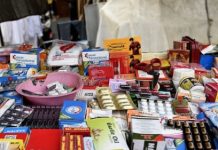
The age long tradition of preserving food with fresh leaves is fast going into extinction, the News Agency of Nigeria (NAN) survey reports.
The survey conducted by NAN on Sunday in Abuja revealed that most young people have no knowledge of this traditions which have enormous benefits.
Mrs Ibironke Olubamise, the National Coordinator, Global Environment Facility (GEF) Small Grants Programme, urged parents to train their children on the art and skills of using wrapping leaves at homes.
NAN reports that wrapping leaves known as Thaumatococus danielli grow and spread naturally under planted tree plantations.
Thaumatococcus daniellii is a plant species from Africa, known for being the natural source of thaumatin an intensely sweet protein which is of interest in the development of sweeteners.
The leaves are harvested and packed into large bundles, transported to small and large markets for retailing in small units. It is used to wrap hot food such as bean cake, corn meal, pounded yam and rice.
Olubamise said the skill gap in the arts of packaging food with wrapping leaves made many young ladies to prefer other packaging materials such as plastics and nylon and containers.
According to her, relegation and breakdown of our healthy cultural and societal values and our nutritional management and home economics are matters of concern.
“These are responsible for the difficulty encountered by younger women to learn the use of leaves and the kitchen techniques for wrapping local hot food with leaves.
“Findings obtained through food preparation workshop and exhibitions revealed that some parents have not made it a habit to train their daughters on the art and skills of using naturally available products such as wrapping leaves at home.
“The gap in knowledge transfer has affected many families making many younger women not ready to learn the skills even when they reach matured ages.
“The skill gap in arts of food preparation makes many young ladies to prefer other packaging materials such as plastics and nylon and containers.
“These unhealthy cultural, societal and environmental damaging habits are seen as modern approaches, but the trend is going down based on the popularity of the wrapping leaves and its preference by many people in the society.’’
According to her, nylon and plastics are damaging to the environment when not well managed.
“The first problem of nylon is that it is not biodegradable. It continues to sit on landfills for decades and not easily broken-down, constituting menace of solid waste in rural and urban management areas of the world.
“Nylon is a product of non-renewable resource (oil) and it contains micro plastic fibres which end up in waterways and oceans when it is washed off,’’ Olubamise said.
Also, Mr Alade Adeleke, the Director in charge of GEF Wrapping Leaf Project, stressed the need for relevant authorities to partner with farmers in the cocoa production systems to produce more wrapping leaves.
Adeleke said that this would ensure availability of the leaves and expand the economic opportunities for rural population, most especially women.
“Market survey done in 2017 suggests that a pack of 20 pieces of leaves cost an average of N150 which is equivalent to 0.35 dollar then.
“Today, a pack of 20 leaves in major city market is as high as N500 which is an equivalent of 0.60 dollar.
“Cost of transportation is higher and cost of collection from the very forest areas is also almost double, but nylon is more affordable and available,’’ he said.
Adeleke added that the trade in wrapping leaves sales provided occupation for over 500,000 people in different communities in south west of the country.
According to him, the trade has been around for centuries and continue to be a generation to generation enterprise that supports low income families in south west Nigeria.
Also speaking, Dr Emmanuel Beckley said wrapping leaves known as thaumatococcus Daniellii are much safer than nylon, plastic and containers.
“Food like bean cake and moi-moi package with wrapping leaves are much safer because when nylon is heated, it releases chemicals which can be carcinogenic to human health.
‘`The heated nylons are highly toxic and can cause reproductive problems, damages to the immune system and also interfere with the hormones thereby resulting to cancer.
“In nutshell, the leaves are beneficial in diverse ways such as helping in the management of diabetes and good functions of the organs in the body.”
According to Mrs Esther Monday, wrapping leaf is good but it is difficult to use to prepare food.
Mr Godwin Ezekiel said when he was still young in his village, his mother used wrapping leaves to prepare food but now his wife used nylon because she did not have the skill to use the wrapping leaves.
Mrs Hajara Ladi, a business woman, said that she preferred to eat moi-moi packaged with wrapping leaves but she found it difficult to get the leaves.
‘`I love moi-moi packaged with wrapping leaves; although I eat moi-moi that is made with nylon and tins due to scarcity of wrapping leaves”
‘`Moi-moi made with nylon needs a lot of ingredients to make it sweet and eatable because there is no special taste that comes with nylon,” Ladi said.
She said when she did not have money to buy nylon to package moi-moi, she used tin even though milk tin is stressful and easily hurts her hands when washing it.
“But all in all, “I love and prefer moi-moi packaged with wrapping leaves any day any time,” she said.
According to Mrs Abigail Adams, who sells food in new Nyanya market, Nasarawa state, the moi-moi packaged with wrapping leaf is very good because it is100 per cent natural and even adds flavour to the moi-moi.
Mr John Ndubuisi, a pharmacist in New Nyanya, Nasarawa State, said that the leaf is better than nylon because nylon is harmful to human body.
Ndubuisi warned people against cooking moi-moi and other foods in nylons, saying that it produced dioxins, a toxic substance that caused cancer. (NAN)













